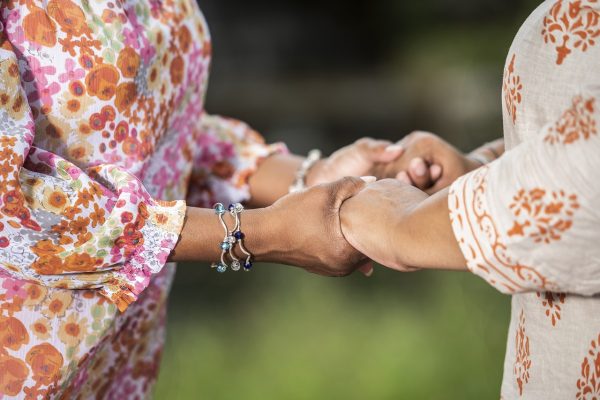Prayer excerpted from article “Ambivalence – When the Abortion on the Table is Your Own” (see PDF at the bottom for the full article).
Before our first trip to the clinic, I had looked for Jewish prayers or rituals that sanctified abortion, but the little I found addressed only losses that followed “medically necessary” procedures. I knew I needed to bring a sense of kedusha, of blessing and wholeness, to the abortion while I was experiencing it, but even as I lay on the operating table squeezing Steven’s hand so hard that his knuckles turned white, I was unable to access that kedusha. Then something happened.
My presentness to the physical pain, my acknowledgment of the power I was assuming through my decision to end potential life, and my understanding that I was not alone in this journey … coalesced, without my help, into words:
בְּרוּכָה אַתְּ רחמאמא שֶׁעוֹזֶרֶת לָנוּ לִבְחֹר חַיִּים
Brukhah At Rahamaima, sh’ozeret lanu, livhor hayyim. Amen.
Bless You, Rahamaima, Compassionate Nurturer of Life, who helps us choose life. Amen.
I said the words to Steven and asked him to whisper them over and over in my ear. To me, a brakhah — a blessing — represents the pinnacle of presentness. Then I asked for the gas (I was so “present” that I gave my body permission to have an easier ride), and the pain became bearable.
Addressed in the feminine — “Brukhah At” — to “Rahamaima,” a name for God that first birthed itself, 30 years ago, among a small group of women, including me, who were writing one of the first feminist haggadot. Rahamaima combines three Hebrew words: rehem (womb); rahamim (compassion; related etymologically to “womb”); and ima (mother). Divinity here is a compassionate, female gestater of life. Imagining God in this way came out of a process I called “spiritual activism.”
“Sh’ozeret lanu” [“who helps us”] reflects my theological stance: that there is something “out there” besides us sentient humans. “It” doesn’t have a plan, “it” doesn’t choose life, but it “helps us” — partners and enables us — to see our job, our role, where we need to go. We know about this “something” beyond us that contributes to the world because it happens through us.
The words “You” and “us”: During the abortion, my partner kept whispering the prayer in my ear, over and over, the syllables incantatory. “You” and “us” eradicated my feelings of being, somehow, the only one. They connected me to Divinity, to my partner, and to every woman who ever chose to have an abortion or will one day do so.
The prayer’s message is radically different from the Kaddish or from the words Jews say in response to a death — “Dayan ha-emet!” [“God is the righteous judge!”] — which don’t engage relationally with us, which don’t join us in our sorrow. The Kaddish resolves the unresolvable problem of mortality and anguishing loss by simply trumping it (“Let the glory of God be extolled, let His great name be hallowed, let His great name be blessed.”). My female prayer, on the contrary, is an embrace.
“Livhor” — “to choose.” The first time I went to the abortion clinic, I couldn’t go through with it and left with my pregnancy still intact. During the six days that followed, I came to terms with the awesome charter of my choice. Okay, this is inescapable, I told myself. I can’t pretend I’m not doing it. “Pro-choice,” “pro-life” — I was taking
responsibility for my power.
Deborah Eisenbach-Budner has worked as an Education Director in synagogues for the last two decades. She has a special commitment to ritual innovation that enfranchises marginalized Jews (orange on the seder plate and eighth blessing for inclusion of LGBT folks) or honors human experience previously invisible in Jewish life. She is also working on the spirituality of parenting and other everyday occupations.
This ritual first appeared as part of “Our Reproductive Selves” in Lilith Magazine.
Read the full article here or at the PDF below.











